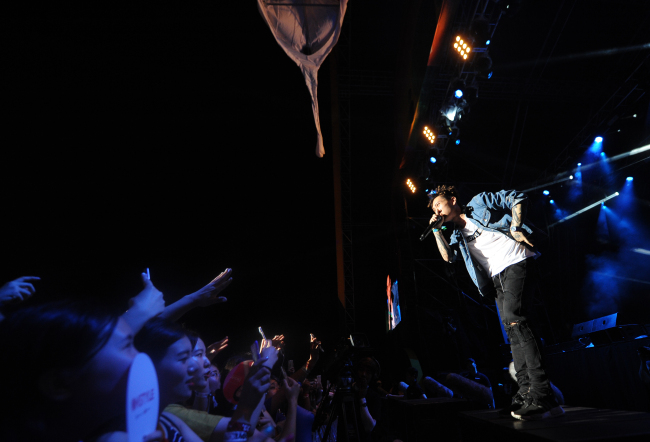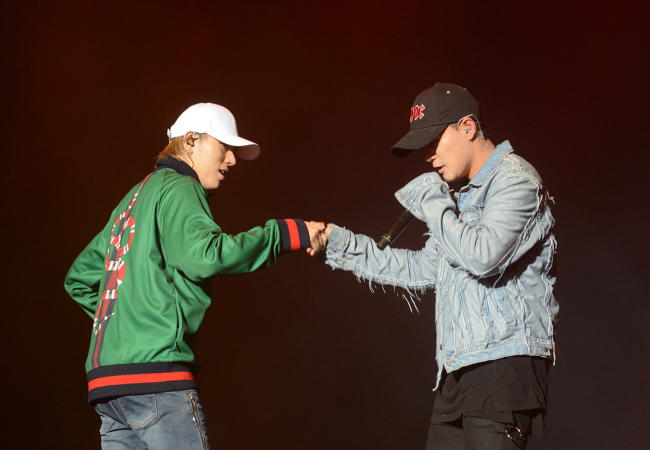Young women drive Korean hip-hop scene
Women in 20s-30s heaviest hip-hop consumers
By Rumy DooPublished : Aug. 1, 2016 - 15:29
What started out as a subculture street movement in African-American communities in New York in the 1970s has now become a mainstream music genre enjoyed by young women here.
In Korea today, hip-hop is taking over mainstream pop charts and, surprisingly, women in their 20s and 30s are the biggest consumers of the genre once considered subversive.
Those present at recent hip-hop shows may have noticed the masses of 20- to 30-something women with snapbacks backwards on their heads outnumbering their male counterparts. At rap team Dynamic Duo’s Itaewon concert from July 23-24, 64 percent of tickets were reserved by women in their 20s and 30s, according to online ticket vendor Interpark.
On average, women account for over 70 percent of upcoming hip-hop concert reservations, according to Interpark figures, with some shows booked nearly 90 percent by women.
More than 89 percent of those who booked tickets for “Brother,” a joint concert featuring Zico, Dean and Crush -- arguably the three trendiest, chart-topping rap artists here today -- slated for Sept. 3 in Gwangju, are women. Of that 89 percent, more than 60 percent are in their 20s and 30s.
In Korea today, hip-hop is taking over mainstream pop charts and, surprisingly, women in their 20s and 30s are the biggest consumers of the genre once considered subversive.
Those present at recent hip-hop shows may have noticed the masses of 20- to 30-something women with snapbacks backwards on their heads outnumbering their male counterparts. At rap team Dynamic Duo’s Itaewon concert from July 23-24, 64 percent of tickets were reserved by women in their 20s and 30s, according to online ticket vendor Interpark.
On average, women account for over 70 percent of upcoming hip-hop concert reservations, according to Interpark figures, with some shows booked nearly 90 percent by women.
More than 89 percent of those who booked tickets for “Brother,” a joint concert featuring Zico, Dean and Crush -- arguably the three trendiest, chart-topping rap artists here today -- slated for Sept. 3 in Gwangju, are women. Of that 89 percent, more than 60 percent are in their 20s and 30s.

A similar trend is seen at the High Hip-Hop Festival, set for Aug. 20 in Seoul and featuring rappers San E, Loco and Baechigi, where 89.5 percent of those who reserved tickets so far are women, including 72.7 percent in their 20s and 30s.
Self-expression, self-satisfaction
Hip-hop’s embrace of self-expression is one of the reasons behind its popularity among women, culture critic Jung Deok-hyun noted.
“There’s tension between genders in our society right now,” he said. As a group, women have grown more sensitive to hints of discrimination and are more resistant to pressures to be demure, he noted.
Boy band BTS, for example, drew flak earlier this month when its song “Miss Right” included lyrics about women who should “hold my hand instead of luxury purses” and “appreciate character rather than jealousy or envy.” Comments posted on online forums showed that female fans were outraged at being told to “act a certain way.”
“Hip-hop is defined by communication and its usefulness in sending a message,” said Jung. “It attracts people who want to overcome stereotypes,” he added.
If hip-hop met the needs of African-American males in the U.S. decades ago, the genre now seems to meet the needs of young Korean women resisting being boxed into conservative roles -- like the contestants in the female-only rap audition show “Unpretty Rapstar,” the third season of which kicks off Friday.
According to the show’s producer Ko Ik-jo, the program spotlights female rappers “with personality” who are outspoken and honest -- often brutally so -- about their opinions. This season is set to be “more ferocious than ever,” he said at a press conference last week.

Meanwhile, some point to the difference between the “brand” of hip-hop popular in Korea and the hardcore gangster rap origins of hip-hop. It is seen less as a tool for defiance and more as a symbol of “trendiness” -- hence its popularity, according to Kim Ji-yoon, 25, a fan of Zico.
“His songs are softer, chic and addictive,” said Kim about the rapper, whose song “Boys and Girls,” like most other hip-hop tracks on local charts, has a cheery melody and bouncy beats. “There’s this image that you’re free-spirited and know how to have fun if you like hip-hop,” Kim added.
According to analysis by Interpark, the site’s VVIP customers consist, on average, of women office workers aged 36.7 years old who spend some 3 million won ($2,700) per year on tickets to 35 concerts.
Though female consumers have traditionally held sway over the entertainment industry, the influence of women in their 20s and 30s on trends has become more marked than ever, according to a Samsung Securities report released in May.
Female consumers who were teenagers when the first generation of K-pop boy bands took the country by storm in the 1990s have recently entered their late 20s, 30s and even early 40s, the report noted. Now equipped with purchasing power, these women, who are willing to spend money for self-gratification and have a penchant for cultural activities, are largely driving the concert industry today, the report said.
By Rumy Doo (doo@heraldcorp.com)




![[Weekender] Korean psyche untangled: Musok](http://res.heraldm.com/phpwas/restmb_idxmake.php?idx=644&simg=/content/image/2024/05/02/20240502050841_0.jpg&u=)

![[Eye Interview] 'If you live to 100, you might as well be happy,' says 88-year-old bestselling essayist](http://res.heraldm.com/phpwas/restmb_idxmake.php?idx=644&simg=/content/image/2024/05/03/20240503050674_0.jpg&u=)










![[Herald Interview] Director of 'Goodbye Earth' aimed to ask how we would face apocalypse](http://res.heraldm.com/phpwas/restmb_idxmake.php?idx=652&simg=/content/image/2024/05/03/20240503050732_0.jpg&u=)
